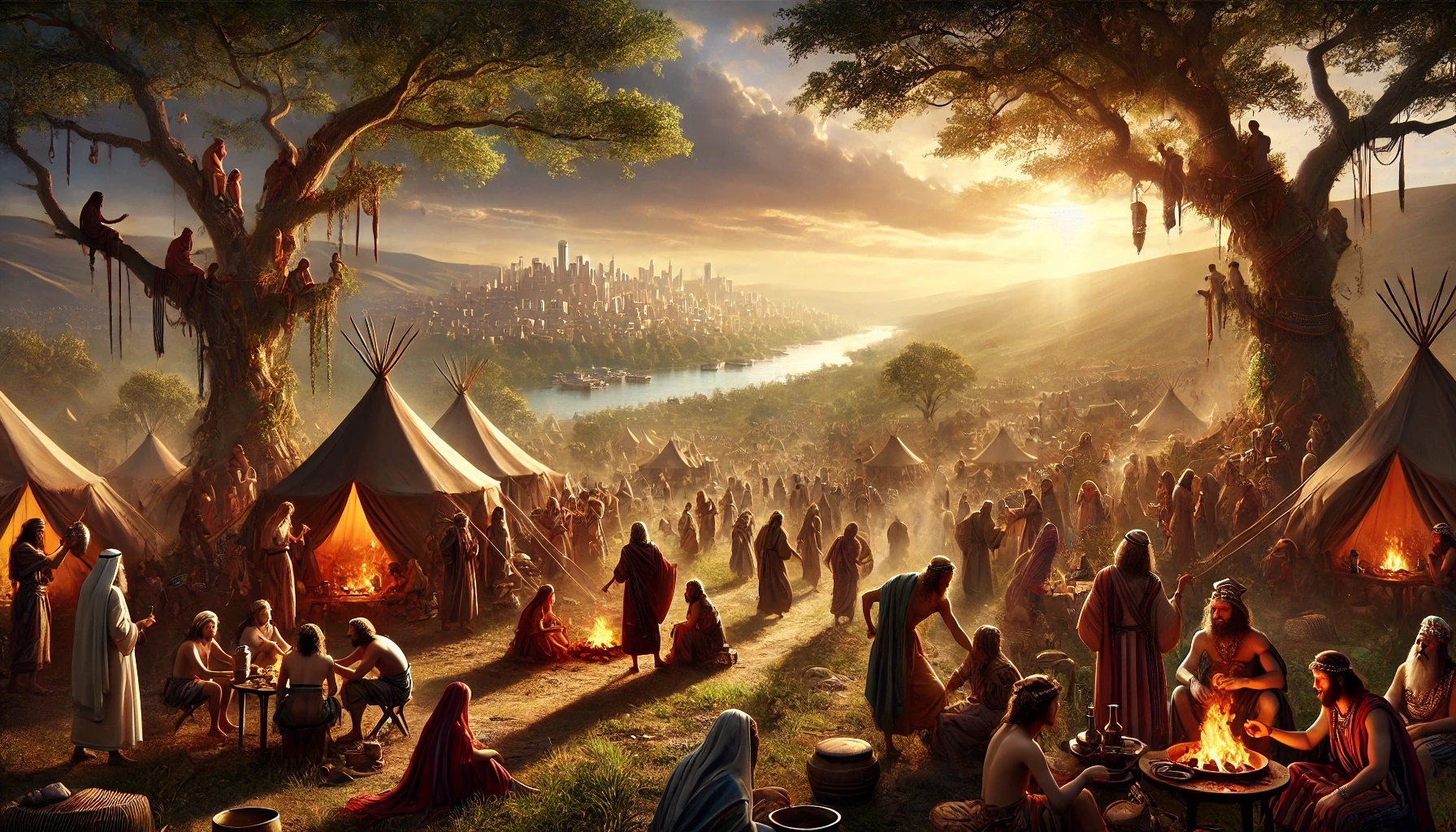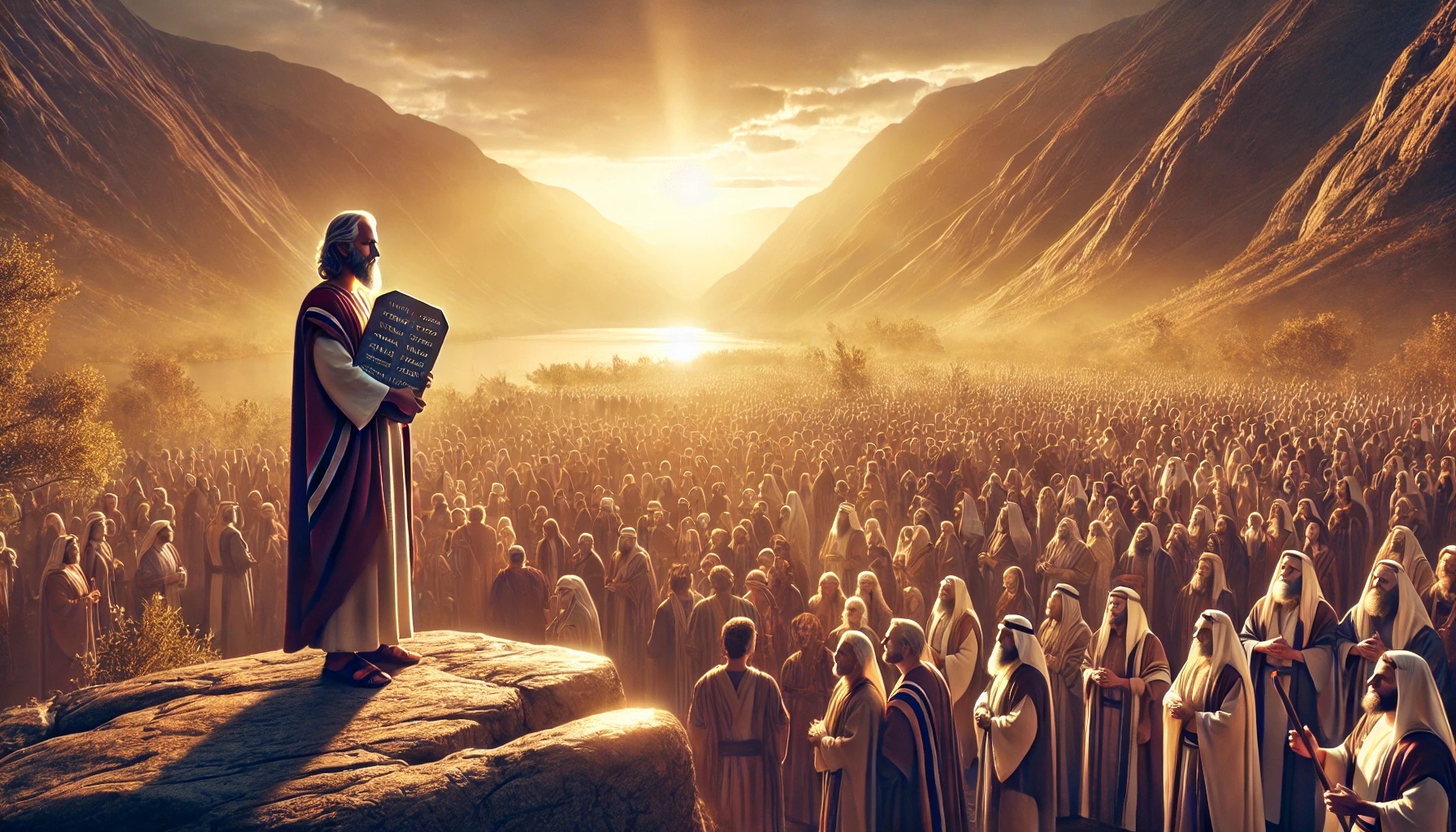
📅 22.November 2025
📚 BELIEVE HIS PROPHETS
📖 Daily Bible Reading
⚖️ Judges 9 – Abimelech – When Power Becomes a Trap
✨ A chapter about ambition, betrayal, and God’s judgment
📜 Bible Text – Judges 9 (KJV)
1 And Abimelech the son of Jerubbaal went to Shechem unto his mother’s brethren, and communed with them, and with all the family of the house of his mother’s father, saying,
2 Speak, I pray you, in the ears of all the men of Shechem, Whether is better for you, either that all the sons of Jerubbaal, which are threescore and ten persons, reign over you, or that one reign over you? remember also that I am your bone and your flesh.
3 And his mother’s brethren spake of him in the ears of all the men of Shechem all these words: and their hearts inclined to follow Abimelech; for they said, He is our brother.
4 And they gave him threescore and ten pieces of silver out of the house of Baalberith, wherewith Abimelech hired vain and light persons, which followed him.
5 And he went unto his father’s house at Ophrah, and slew his brethren the sons of Jerubbaal, being threescore and ten persons, upon one stone: notwithstanding yet Jotham the youngest son of Jerubbaal was left; for he hid himself.
6 And all the men of Shechem gathered together, and all the house of Millo, and went, and made Abimelech king, by the plain of the pillar that was in Shechem.
7 And when they told it to Jotham, he went and stood in the top of mount Gerizim, and lifted up his voice, and cried, and said unto them, Hearken unto me, ye men of Shechem, that God may hearken unto you.
8 The trees went forth on a time to anoint a king over them; and they said unto the olive tree, Reign thou over us.
9 But the olive tree said unto them, Should I leave my fatness, wherewith by me they honour God and man, and go to be promoted over the trees?
10 And the trees said to the fig tree, Come thou, and reign over us.
11 But the fig tree said unto them, Should I forsake my sweetness, and my good fruit, and go to be promoted over the trees?
12 Then said the trees unto the vine, Come thou, and reign over us.
13 And the vine said unto them, Should I leave my wine, which cheereth God and man, and go to be promoted over the trees?
14 Then said all the trees unto the bramble, Come thou, and reign over us.
15 And the bramble said unto the trees, If in truth ye anoint me king over you, then come and put your trust in my shadow: and if not, let fire come out of the bramble, and devour the cedars of Lebanon.
16 Now therefore, if ye have done truly and sincerely, in that ye have made Abimelech king, and if ye have dealt well with Jerubbaal and his house, and have done unto him according to the deserving of his hands;
17 (For my father fought for you, and adventured his life far, and delivered you out of the hand of Midian:
18 And ye are risen up against my father’s house this day, and have slain his sons, threescore and ten persons, upon one stone, and have made Abimelech, the son of his maidservant, king over the men of Shechem, because he is your brother;)
19 If ye then have dealt truly and sincerely with Jerubbaal and with his house this day, then rejoice ye in Abimelech, and let him also rejoice in you:
20 But if not, let fire come out from Abimelech, and devour the men of Shechem, and the house of Millo; and let fire come out from the men of Shechem, and from the house of Millo, and devour Abimelech.
21 And Jotham ran away, and fled, and went to Beer, and dwelt there, for fear of Abimelech his brother.
22 When Abimelech had reigned three years over Israel,
23 Then God sent an evil spirit between Abimelech and the men of Shechem; and the men of Shechem dealt treacherously with Abimelech:
24 That the cruelty done to the threescore and ten sons of Jerubbaal might come, and their blood be laid upon Abimelech their brother, which slew them; and upon the men of Shechem, which aided him in the killing of his brethren.
25 And the men of Shechem set liers in wait for him in the top of the mountains, and they robbed all that came along that way by them: and it was told Abimelech.
26 And Gaal the son of Ebed came with his brethren, and went over to Shechem: and the men of Shechem put their confidence in him.
27 And they went out into the fields, and gathered their vineyards, and trode the grapes, and made merry, and went into the house of their god, and did eat and drink, and cursed Abimelech.
28 And Gaal the son of Ebed said, Who is Abimelech, and who is Shechem, that we should serve him? is not he the son of Jerubbaal? and Zebul his officer? serve the men of Hamor the father of Shechem: for why should we serve him?
29 And would to God this people were under my hand! then would I remove Abimelech. And he said to Abimelech, Increase thine army, and come out.
30 And when Zebul the ruler of the city heard the words of Gaal the son of Ebed, his anger was kindled.
31 And he sent messengers unto Abimelech privily, saying, Behold, Gaal the son of Ebed and his brethren be come to Shechem; and, behold, they fortify the city against thee.
32 Now therefore up by night, thou and the people that is with thee, and lie in wait in the field:
33 And it shall be, that in the morning, as soon as the sun is up, thou shalt rise early, and set upon the city: and, behold, when he and the people that is with him come out against thee, then mayest thou do to them as thou shalt find occasion.
34 And Abimelech rose up, and all the people that were with him, by night, and they laid wait against Shechem in four companies.
35 And Gaal the son of Ebed went out, and stood in the entering of the gate of the city: and Abimelech rose up, and the people that were with him, from lying in wait.
36 And when Gaal saw the people, he said to Zebul, Behold, there come people down from the top of the mountains. And Zebul said unto him, Thou seest the shadow of the mountains as if they were men.
37 And Gaal spake again, and said, See there come people down by the middle of the land, and another company come along by the plain of Meonenim.
38 Then said Zebul unto him, Where is now thy mouth, wherewith thou saidst, Who is Abimelech, that we should serve him? is not this the people that thou hast despised? go out, I pray now, and fight with them.
39 And Gaal went out before the men of Shechem, and fought with Abimelech.
40 And Abimelech chased him, and he fled before him, and many were overthrown and wounded, even unto the entering of the gate.
41 And Abimelech dwelt at Arumah: and Zebul thrust out Gaal and his brethren, that they should not dwell in Shechem.
42 And it came to pass on the morrow, that the people went out into the field; and they told Abimelech.
43 And he took the people, and divided them into three companies, and laid wait in the field, and looked, and, behold, the people were come forth out of the city; and he rose up against them, and smote them.
44 And Abimelech, and the company that was with him, rushed forward, and stood in the entering of the gate of the city: and the two other companies ran upon all the people that were in the fields, and slew them.
45 And Abimelech fought against the city all that day; and he took the city, and slew the people that was therein, and beat down the city, and sowed it with salt.
46 And when all the men of the tower of Shechem heard that, they entered into an hold of the house of the god Berith.
47 And it was told Abimelech, that all the men of the tower of Shechem were gathered together.
48 And Abimelech gat him up to mount Zalmon, he and all the people that were with him; and Abimelech took an axe in his hand, and cut down a bough from the trees, and took it, and laid it on his shoulder, and said unto the people that were with him, What ye have seen me do, make haste, and do as I have done.
49 And all the people likewise cut down every man his bough, and followed Abimelech, and put them to the hold, and set the hold on fire upon them; so that all the men of the tower of Shechem died also, about a thousand men and women.
50 Then went Abimelech to Thebez, and encamped against Thebez, and took it.
51 But there was a strong tower within the city, and thither fled all the men and women, and all they of the city, and shut it to them, and gat them up to the top of the tower.
52 And Abimelech came unto the tower, and fought against it, and went hard unto the door of the tower to burn it with fire.
53 And a certain woman cast a piece of a millstone upon Abimelech’s head, and all to brake his skull.
54 Then he called hastily unto the young man his armourbearer, and said unto him, Draw thy sword, and slay me, that men say not of me, A women slew him. And his young man thrust him through, and he died.
55 And when the men of Israel saw that Abimelech was dead, they departed every man unto his place.
56 Thus God rendered the wickedness of Abimelech, which he did unto his father, in slaying his seventy brethren:
57 And all the evil of the men of Shechem did God render upon their heads: and upon them came the curse of Jotham the son of Jerubbaal.
══════════════════════════════════════════════
🔵 Introduction
Chapter 9 in the Book of Judges is a dramatic story filled with political intrigue, abuse of power, and divine judgment. It tells how Abimelech—the son of Gideon (Jerubbaal)—became king through violence and deceit, and how he ultimately perished by the same violence he had sown. The lessons from this chapter are sobering and highly relevant today.
══════════════════════════════════════════════
🟡 Commentary
🟫 1. The Rise Through Violence (Verses 1–6)
Abimelech wanted to become king—not by calling, but by manipulation.
He killed his 70 brothers so he could rule alone.
The people of Shechem supported him—not because God appointed him, but because of family ties.
→ Power without God’s calling is dangerous from the very beginning.
🟫 2. Jotham’s Parable (Verses 7–21)
Jotham, the only surviving brother, told the famous parable of the trees seeking a king.
Noble trees like the olive, fig, and vine refused—only the thornbush accepted.
→ The warning is clear: when people choose low, destructive leaders, they must live with the consequences.
🟫 3. Internal Destruction (Verses 22–45)
After three years, the people of Shechem turned against Abimelech.
Intrigue, betrayal, and violence followed—the very tools with which he built his rule.
The city was destroyed, and salt was scattered over its ruins.
→ Whoever rules through injustice will reap disaster.
🟫 4. The Bitter End (Verses 50–57)
Abimelech died ironically at the hand of a woman who threw a millstone on his head.
To avoid this “shame,” he asked his armor-bearer to kill him.
→ Pride until the last breath—yet God had the final word.
══════════════════════════════════════════════
🟢 Summary
-
Abimelech was not appointed by God, but seized power through violence.
-
The people supported him and became complicit.
-
God’s judgment fell on both.
-
Jotham’s fable was prophetic—those who submit to a thornbush will be consumed by its fire.
-
God cannot be mocked—justice prevails in the end.
══════════════════════════════════════════════
💬 Reflection Thought
-
Not everyone who has influence or power is appointed by God.
-
People often follow the wrong leaders out of self-interest.
-
Beware the “thornbush”—there are leadership styles that cause destruction.
-
God sees what happens in secret.
-
Sin brings long-term consequences—for both perpetrators and supporters.
══════════════════════════════════════════════
💬 Reflection
Where in your life do you pursue your own goals by wrong means?
Do you choose your “leaders” (influences, ideals, voices) with spiritual discernment—or simply because it’s convenient or familiar?
Are you willing, like Jotham, to stand up for truth even if you stand alone?
~~~~~ ⚖️ ~~~~~

📆 16–22 November 2025
📚 BELIEVE HIS PROPHETS
📖 Weekly Reading – Spirit of Prophecy
📘 Ellen White | Patriarchs and Prophets – Chapter 41
🔥 Apostasy at the Jordan | Warning against spiritual apostasy and moral seduction
🌐 Read online here
═════════════════════════════════════════════
🔵 Introduction
The people of Israel stood directly at the border of the promised land. After great victories and divine guidance, the long-awaited homeland was within reach. But precisely in this moment of outward success, rest, and comfort came one of the worst spiritual collapses in Israel’s history: the apostasy at Baal-Peor.
This chapter vividly describes how moral seduction, spiritual unfaithfulness, and worldly mingling separated God’s people from their Lord—and what deep spiritual lessons it holds for us today.
═════════════════════════════════════════════
🟡 Commentary
🟪 1. The surroundings of Shittim – beauty and danger
Israel camped in a fertile, tropical plain by the Jordan. Outward prosperity, pleasant surroundings, and rest felt relaxing—but also disarming. This phase of leisure became a spiritual trap.
🟪 2. The secret seduction by the Midianite women
Midianite women entered the camp unobtrusively. Their intention was not friendship, but targeted seduction into sin. Under the guise of harmony and culture, the Israelites were to be led into idolatry and moral excess.
🟪 3. The feast in honor of the idols – Balaam’s strategy
Balaam, who had previously been unable to curse Israel, now found another way: he led the people close to temptation. Music, wine, cheerful feasting, and sensual allure undermined their self-control. Moral fall turned into idolatry.
🟪 4. The deadly plague – the consequences of apostasy
The spiritual and moral collapse had catastrophic consequences:
– A plague broke out that took tens of thousands.
– The leaders of the apostasy were judged.
– The camp underwent drastic purification.
🟪 5. The zeal of Phinehas
With holy determination, Phinehas acted to stop the judgment.
God affirmed his action and granted him the “covenant of peace”—an everlasting priesthood.
The message: God’s zeal against sin is an expression of His love for His people.
🟪 6. God’s judgment on Midian
Because Midian had deliberately led Israel into sin, divine judgment followed.
The lesson: those who cause others to fall spiritually bear tremendous responsibility.
🟪 7. The timeless warning—from the Old Testament to the end times
The account is not merely past. Paul explicitly states:
“This happened to them as an example … written for our admonition.” (1 Cor. 10:11)
Just as then:
– Seduction through pleasures
– Blending with worldly values
– moral dullness
– playing with temptation
still lead us away from God.
🟪 8. The spiritual mechanism of falling
The decline does not begin suddenly, but:
– thoughts become impure
– vigilance weakens
– prayer is neglected
– association with the world becomes careless
– small compromises accumulate
– in the end, a person visibly falls into sin
🟪 9. God’s way of escape: purity of heart
The Bible calls for a sanctified, guarded inner life:
– “Guard your heart” (Prov. 4:23)
– “Gird up the loins of your mind” (1 Pet. 1:13)
– “Whatever is true… think on these things!” (Phil. 4:8)
– “Create in me a clean heart” (Ps. 51:10)
Victory over temptation always begins in the heart—not in outward behavior.
═════════════════════════════════════════════
🟢 Summary
The apostasy at the Jordan shows that the greatest enemy of God’s people is not external threats but inner susceptibility. Israel did not fall by war, but by moral corruption and spiritual negligence. The path into sin began quietly, led to open excess, and ended in heavy judgment. Yet God offers purity, renewal, and protection to those who remain watchful and treasure His Word in their hearts.
═════════════════════════════════════════════
📢 Message for Us Today
Spiritually speaking, we stand just as close to the “heavenly Canaan” as Israel did then. That is why the danger today is great—to fall in this final phase of history through comfort, worldly blending, or moral temptation. Satan uses the same means as then:
– sensual allure
– love of pleasure
– mingling with godless values
– neglect of prayer
– compromises in thinking
Therefore God’s call is:
Watchfulness, purity of heart, separation from destructive influences, and deep connection with His Word.
═════════════════════════════════════════════
💬 Reflection Questions
What “Shittim moments” are there in my life—times of rest or self-satisfaction when I am particularly vulnerable to temptation? And how can I guard my heart before small compromises grow into great sins?
~~~~~ ⚖️ ~~~~~

📆 16–22 November 2025
📚 BELIEVE HIS PROPHETS
📖 Weekly Reading – Spirit of Prophecy
📘 Ellen White | Patriarchs and Prophets – Chapter 42
🔥 The Law Repeated | Moses’ final exhortations and God’s enduring call to obedience
🌐 Read online here
═════════════════════════════════════════════
🔵 Introduction
Shortly before entering the promised land, Moses gathers the people of Israel one last time. He knows that his time as leader is ending—and that he himself will not enter Canaan. But before he departs, he repeats God’s law and reminds them of the great responsibility connected with the covenant with God. In a passionate, far-reaching appeal, he calls the people to faithfulness, obedience, and a choice for life.
═════════════════════════════════════════════
🟡 Commentary
🟪 1. Moses’ farewell in humility and concern
Moses asks God to allow him to go into the land—God does not permit it. Yet Moses accepts God’s decision and is not concerned about himself but about the people. He asks for a successor—and God chooses Joshua.
🟪 2. Joshua’s calling – a spiritual leader appointed
God chooses Joshua, “a man in whom is the Spirit” (Num. 27:18). Moses lays hands on him before the whole nation, investing him with authority. This shows: leadership is not human ambition but a divine commission.
🟪 3. Why the law needed to be repeated
The new generation was young at Sinai. They needed to hear God’s law again—to understand why obedience is the foundation for blessing, safety, and fellowship with God. The repetition was meant to touch heart and conscience anew.
🟪 4. Looking back at God’s guidance and grace
Moses reminds Israel of:
-
the deliverance from Egypt
-
the miracles in the wilderness
-
the giving of the law
-
God’s nearness
He shows: No other nation was ever so loved, guided, and blessed by God.
🟪 5. Israel—chosen out of love, not merit
“Not because you were more in number… but because He loved you” (Deut. 7:7–9). God’s covenant is based on faithfulness and grace—not on Israel’s strength. This truth is central to prevent pride and self-righteousness.
🟪 6. The promised land – both gift and responsibility
Moses describes the land: fertile, beautiful, supplied by God. But the warning follows immediately: When you are full, do not forget the Lord (Deut. 6:10–12). Prosperity can become a danger if it creates spiritual drowsiness.
🟪 7. Blessing and curse – the choice of life
Chapter 28 contains two mighty lists:
-
Blessing for obedience: abundance, protection, success
-
Curse for disobedience: hardship, scattering, judgment
These warnings were tragically fulfilled in Israel’s history—among them the destruction of Jerusalem by Rome.
🟪 8. The solemn appeal: Choose life!
“I have set before you life and death, blessing and curse… therefore choose life” (Deut. 30:19).
God does not force—He calls. Obedience is not external duty but a decision born of love for God.
🟪 9. The Song of Moses – remembrance in poetic form
To imprint everything, Moses composes a song. It recounts God’s dealings and warns toward faithfulness. The people are to memorize it and pass it on to future generations—God’s truth is meant to penetrate the heart.
═════════════════════════════════════════════
🟢 Summary
Chapter 42 is Moses’ final great appearance before his death. He repeats the law, calls the people to decision, and transfers leadership to Joshua. The heart of his message: Israel was chosen by grace—now they are to respond with obedience and love. Blessing and curse lie openly before them. The choice is theirs.
═════════════════════════════════════════════
📢 Message for Us Today
We too stand spiritually at the border of the “promised land”—the second coming of Jesus. God’s law still stands as the standard for our lives. The choice between life and death, obedience or our own path, arises anew each day. Prosperity, routine, and spiritual indifference are the same dangers now as then. God’s call applies to us as well:
– Choose life.
– Hold fast to the Word.
– Teach it to your children.
– Live with God—and for God.
═════════════════════════════════════════════
💬 Reflection Questions
➡️ What shapes my daily decisions—comfort or obedience?
➡️ Is God’s law alive in my heart—or merely a duty?
➡️ How can others tell that I have chosen life with God?
➡️ How can I pass on the spiritual heritage to the next generation?
══════════════════════════════════════════════
LuxVerbi | The light of the Word. The clarity of faith.




















